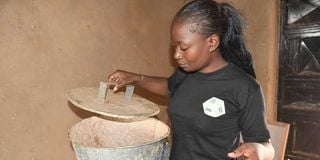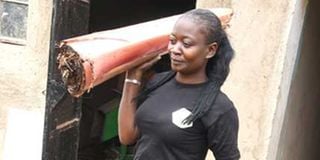Premium
Banana fibre turns dream of sustainable packaging true

Rose Sikulu at her FiberText Green Paper Ltd firm in Namirembe village, Bungoma County.
Banana is one of the staples in many a Kenyan homestead, particularly in the Western region of the country.
While most families grow bananas for consumption and sale, a young entrepreneur in Bungoma is making the most out of the stems by turning them into packaging bags.
Rose Sikulu says her main goal is to eradicate the menace of single-use plastic bags in Kenya.
She believes it will also help fight deforestation as the raw material for paper is trees.
As a child, the now 26-year-old witnessed the large-scale felling of trees for Pan-African Paper Mills in Webuye.
Sikulu studied Industrial Chemistry at Kenyatta University to find a substitute for paper made from trees.
With some savings and business expertise that included running the family’s poultry venture from the time she was in primary school, Sikulu founded FiberText Green Paper Ltd in 2017.
The B2B firm specialises in upcycling banana waste into organic fertiliser and biodegradable packaging.
“We divert banana biomass waste from landfills, reduce environmental pollution caused by rotting biomass and promote sustainable packaging,” she tells Seeds of Gold.
“We also create a closed-loop system by sourcing raw materials from farmers, empowering the community economically and providing biodegradable products that contribute to waste reduction and ecological balance.”
To guarantee a consistent supply, Sikulu talks to more families to grow bananas.
Once the stems arrive, they are measured for height. Fibre from the pseudo stems is extracted, boiled, cleaned and blended.
The pulp is collected using nets. It is then sundried for six hours, turning into paper.
The paper is then cut, folded, and branded according to a customer’s request.
“We sell the bags to businesses in and outside Bungoma County. I have directly employed seven workers and more than 100 indirectly. More are being trained,” Sikulu says.

Rose Sikulu with a banana stem that is ready to be processed. Her products are gaining popularity.
“We target ecologically concerned eateries, boutiques and beauty parlours.”
These businesses are likely to have large margins and steady revenue. Shops that focus on middle and upper class customers are the target of the FiberText.
A FiberText’s unbranded A3 bag costs Sh120, branded with logo goes for Sh150, customised with the client’s logo Sh170, while an A4 unbranded bag retails for Sh80.
She says the items produced by FiberText are sturdy, high-quality, biodegradable, chemical-free and resistant to UV rays.
Sikulu utilises social media to promote her products and takes advantage of networking programmes and exhibitions to reach customers.
Reception has been good, especially with the Kenya Bureau of Standards and the Kenya Industrial Research and Development Institute certifying her products.
Though her major challenge has been acquiring machines, Sikulu is happy to have created jobs for many locals.
“Seeing farmers make additional cash motivates me. We hope to lead the way in environmentally friendly packaging in the near future,” she says, adding FiberText has made a name in the Kenyan market.
“The company’s competitive advantages include aesthetically pleasing products, proximity to raw materials and inexpensive labour.
The packaging sold to food vendors is heat-resistant. FiberText serves at least 300 companies and individuals.
The company’s small size and lean team enable flexibility in decision-making, providing consumers with agility, reactivity and speedy turnaround times.
Apart from receiving multiple honours such as the Presidential Innovation 2023, CITI and the Circular Economy Awards, Sikulu participated in the six-month O-farms E4Impact accelerator programme on business training and agri-circularity.





